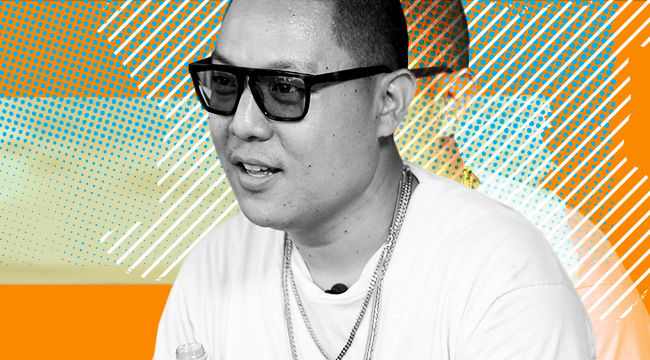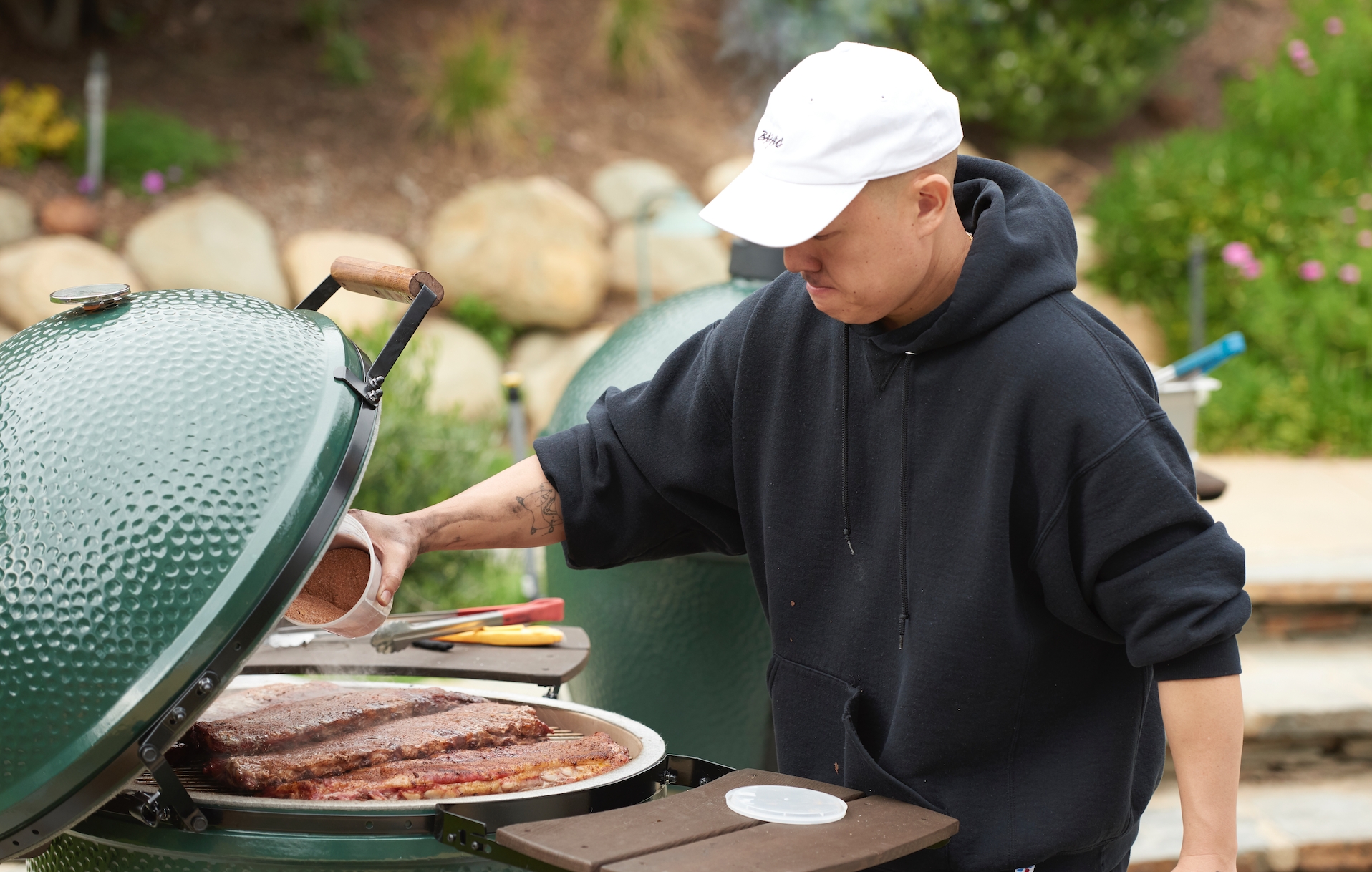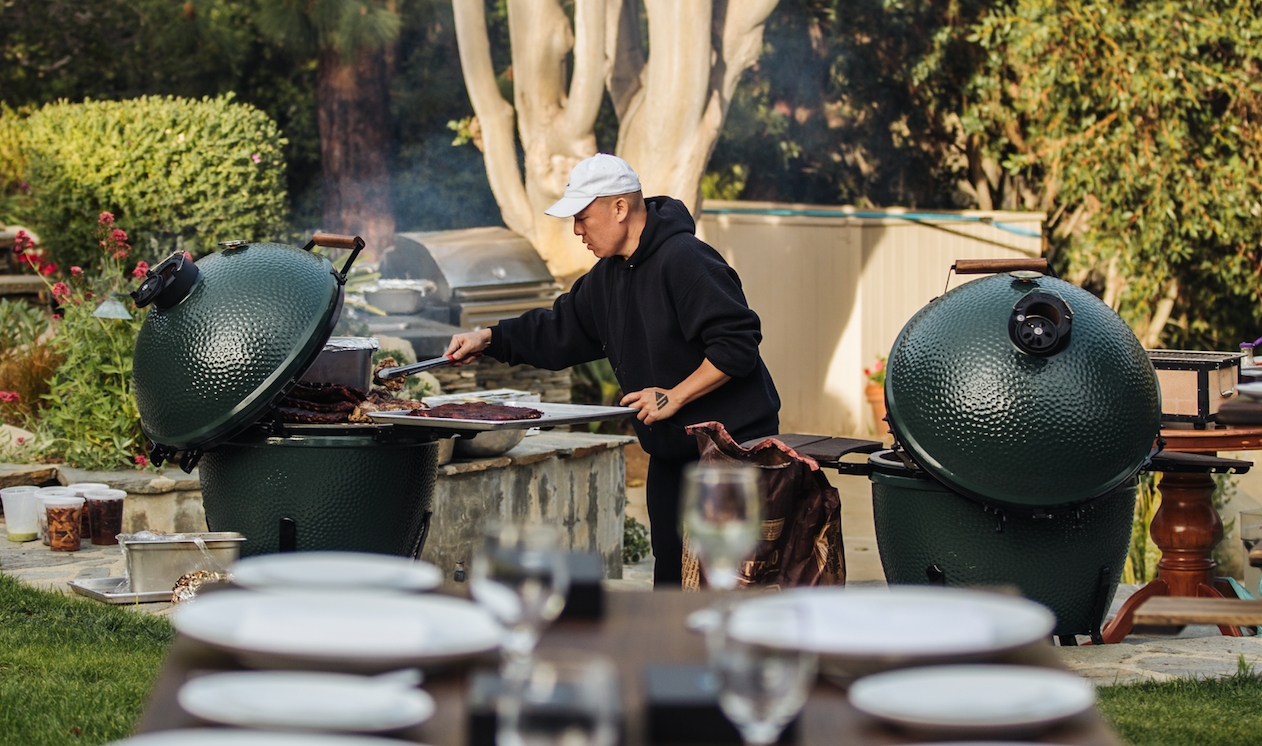
Calling a star chef “an enigma” is a timeworn (and lazy) food writing tradition. Razor-tongued bad boys like Marco Pierre White, painstaking perfectionists like Nancy Silverton, and larger than life showpeople like Jeremiah Tower are all tough for the media to encapsulate in a tidy paragraph. They are at once technicians and artists; craftspeople and connoisseurs; hotheads and sensitive souls.
We won’t buy into this cliché and use the “e word” to describe Eddie Huang, but damn if the dude isn’t layered as hell. Back in the day, he used to straight up shred the famous contestants on Next Iron Chef for Eater. In the meantime, he was making waves in their ocean. His restaurant Baohaus opened in 2009 — a precursor to the fast-casual, small-menu, and highly-stylized-remixing-of-traditional-foods trends. He later opened an LA outpost and a second NYC property. Like Bourdain before him, Huang never stopped mixing writing and time in the kitchen. His 2013 memoir, Fresh off the Boat, was turned into a TV series of the same name… a show which Huang has continually expressed mixed feelings about.
Publicly, Huang’s persona has, at times, sparked controversy — whether he was hosting an all-you-can-drink Four Loko promo or penning a blistering attack of Marcus Samuelsson’s Harlem restaurant, Red Rooster — but when I spoke with him in early June, I found him brimming with good vibes. The man has every reason to be happy: Our conversation came right after he’d kicked off a lucrative collab with blu e-cigs and just before he announced his newest travel show, Cash Only.
Check out our conversation for the chef’s thoughts on pairing food, where to eat, and the sticky issue of food appropriation. (Note: Our convo came before the death of Huang’s friend Anthony Bourdain, but he wrote a touching tribute for Rolling Stone.)

I was supposed to meet you at an event in Malibu where you were pairing food with e-cigs? To be honest, that sounds a little weird to me. Where did that collab come from?
They reached out to us and told us about the flavors and said, “We’d love for you to cook a dinner pairing the vape flavors to your food.”
I came back and said, “Look these flavors are interesting.” I’m not a snob about flavors. I collect wine and champagne. I collect rum. But I also know every flavor of gummy bear there is. I just think flavors are interesting, artificial or synthetic. But I was like, “The pairing thing is a little bit too straightforward, like A to B.”
Too easy?
Yeah, I said, “What I find interesting about the flavors and making a dinner with them is more in the application of heat, how temperature affects food, if there’s a choice to be made in the temperature you’re applying, how you apply temperature to that meat and then also the type of smoke that you are infusing it with.
All of which fits better for their brand, probably, right?
Yeah. So I took a high heat, Japanese-style charcoal grill and I grilled Beijing lamb skewers on it and then had people use polar mint, blu e-cigs to cleanse their palate. Because it’s a dish in China that you always eat on the street and people are smoking cigarettes and it’s kind of like you never really experience the dish without cigarettes and I was like well instead of cigarettes lets just line the palate with this polar mint and it was pretty interesting because that polar mint really dances with the cumin and the Szechuan peppercorn in the dish.
That’s cool. I feel like with weed getting legalized and people taking it very seriously… I guess the idea of “pairing” has widened a lot over the past few years in the food scene.
And it’s all so easy to juke — because there’s no hard science to it. I remember being a kid, you get magazines just to check out the girls and there’s a spreadsheet about “this is a great champagne to go with this food, on a first date.”
The pairing thing has gotten a little bit crazy. I was more like “Look enjoy the vape flavors, taste the vape flavors, taste what’s going on, you understand how smoke affects you, you understand what you think about these flavors but now take a look at this dinner and look at how smoking temperature is applied and you will see some parallel.”
I’ve been writing about food for a long time, I also talk to plenty of chefs who have had TV shows like you have, but you still seem very deep into the technical side of food. You haven’t lost the ability to really conceptualize and think of it in that way. Are you cooking often these days or not really?
I cook a lot. I got my neck tattooed the other night and, in exchange, I just made him short ribs stew. So I brought him a short rib stew and I was doing twice cooked pork. You usually get twice-cooked pork at a restaurant, but I was going to do twice cooked pork with a dry shrimp sauce but then I looked on my dry shrimp can and it had just expired and I was like fuck. So I looked around in the kitchen, I was like alright I remember talking to this master chef that I’m a good friend with and he was like, “Look I switch my twice cooked pork every season, depending on what’s popping.” So I was like, “All right well I’ve got some black garlic, I’ve got some dried scallop…”
So I was like, “Instead of shrimp I’m going to do dried scallop and black garlic twice cooked pork” and I sent that out the door to him. I stay cooking. For me, the thing I don’t plug into as much is who is cheffing at which spot. I don’t follow restaurants like that. I don’t like to go to big openings, I don’t like to eat at a restaurant in the first six months. I really like to wait until it all dies down.
I think there is way too much excitement over new restaurants. I want to go in once it’s a little more worn in.
I absolutely get that. Let the place find its sea legs.
You know what I mean? They have their footing, they’re confident in themselves, they don’t have a chip on their shoulders their not projecting everything like the PR team told them to say.
I like to still stumble into restaurants because that was my favorite thing about New York. I would just take the train, go to canal street, go deep into Brooklyn. I would go to neighborhoods and just walk around, smell things, collect the menus and then you just choose which one to try.
I don’t want to be told what to eat or which team to watch. I’m very rarely reading a critical review. I will only read the critical review if I think something was either exceptionally good or exceptionally bad. Then I go online and am like, “I wonder what Haley Scott said about that restaurant? I wonder what Pete Wells said about the restaurant?”
Do you have — with that in mind — places that you want to shout out right now? Place that you think people should be trying or that maybe the opening buzz has died down, but still live up to the hype?
This one spot I’ve put on my Instagram a lot. This place Tang Hot Pot in the Bowery is really good. It’s a Chinese kid that came in NYU and then once he’s in America he starts to realize that people fuck with our food here. You may not crack into what business you came to America to get into but there’s a real opportunity for food if you’re a Chinaman in this country and you know what you’re doing.
So this kid took his NYU business degree opened up a small shop. Immediately it’s not very good. I went and told him, “This is not good.” He re-grouped, opened his high-end Hot Pot and I was still a little bit skeptical because I don’t like the word “elevate.” He’s not that limber with English, you know what I mean? He is from China, so he would tell me “Yo we’re elevating this or we’re trying to do this upscale,” and I was like, “All right let me just come and eat.”
So I went to the restaurant and I ate the food and was like, this really is lit. This place is amazing. The quality of the meat was better, the presentation, the service — and all the flavors are very true. You see him and his girlfriend running around the restaurant, he obviously hired other young Chinese kids that are his friends. They did really well. I was like this is an interesting spot, and it’s probably my favorite option in New York.
It’s on my list, now. I need to get back to New York.
It goes back to something we talked about earlier: I cook all the time. I’m always practicing and for me wherever I live I always make sure I live near a basketball court or a boxing gym. I’m not going to play basketball or box professionally but these are things that I love. Cooking is one of those things where like all the laws of cooking, all the properties, all of the philosophies — your brain doesn’t lose them.
So my brain is always thinking and working in that way when I go into new places, like Tang Hot Pot.
You’ve been a great voice and an important voice of the difference between food appropriation and appreciation and cooking outside of cultures and inside of cultures. How have your feelings on that evolved over the years, and where are you kind of at with that right now?
My thing has always been, “Who are you serving?” You know what I’m saying?
Just to use the Observer piece as an example, I’ve started to learn that it’s more effective to talk about why you made your decisions as opposed to being like, “I don’t like the decision that guy made.” Every generation must write it’s own book. So I was like, “I cannot just work at the restaurant like my dad did or my grandparents would, or like some other generation Chinese person would. I have to do it in my vision. I have to express my experience.”
That’s all you can do with food and culture is express your experience. I think when you set out to tell someone else’s story that’s when you get into the trouble. I go to Jamaica a lot, I just went to Trinidad, I love the islands. I love cooking with cats out there. It was my boy Julian’s birthday in Trinidad so I went and he was like “Yeah we’re going to go eat at my mom’s.”
And I was like, “Yo man, I just want to cook alongside your mom. I don’t want to … she don’t need to teach me, I don’t need to know what she did with the curry, I just want to sit in the home and cook next to her.”
I’m not even going to try to make their food, I’ll make my food. I just want to sit there, in their home in Trinidad, and cook alongside her. And he was like, “Whatever you want to do, man, go do it.” They started to see, “Oh Eddy’s not here to learn a recipe, he’s not here to learn a technique, he’s actually bringing his own dish and his technique and is sharing it with us, too. What he wants to experience is our home. Our family. Our country.”
I learned a lot from it man. It brought me a lot of joy and I started to see that this is what it is like rolling dumplings at my house while my mom is cooking and it was cool to sit next to somebody else’s mom and do it.
I would just say with the appropriation thing the important thing is to just ask, “Did you experience this? Is this your story you’re telling?” And also, “Who are you telling it to?” If you can answer those questions satisfactorily then you can probably hang.







